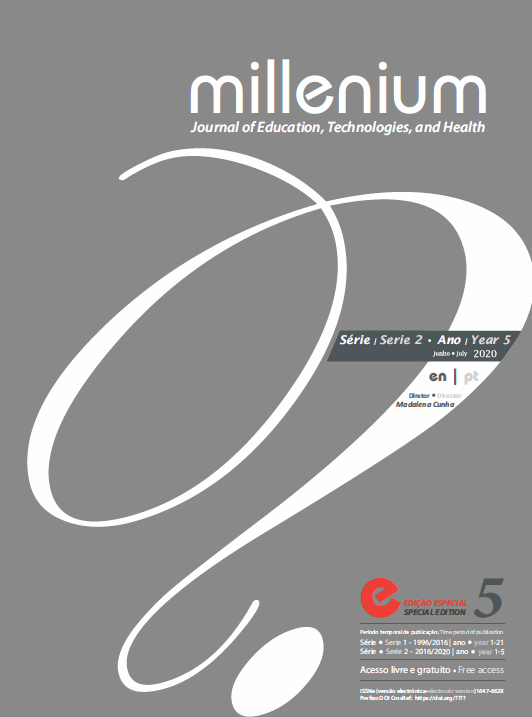Ciudadanía e igualdad de género en niños y adolescentes
la perspectiva de los agentes educativos
DOI:
https://doi.org/10.29352/mill0205e.11.00341Palabras clave:
participación comunitaria, niño, adolescente, géneroResumen
Introducción: El derecho a la educación de los niños / adolescentes en relación con su preparación para el desempeño de la ciudadanía es uno de los objetivos de la educación inclusiva, que debe promover el respeto por la dignidad de los niños / adolescentes, apoyándolos por igual, independientemente de su género.
Objetivos: Evaluar el conocimiento de los agentes educativos sobre ciudadanía e igualdad de género en niños y adolescentes.
Métodos: Estudio cuantitativo, descriptivo, transversal, realizado en una muestra de conveniencia no probabilística, con 136 participantes, docentes (62.5%), enfermeras (32.4%) y policías (5.1%), con una edad media 48,34 años (± 7,49 años), siendo el 70,6% mujeres.
Se utilizó el cuestionario ad hoc, Ciudadanía e igualdad de género en niños y adolescentes (CIG-CA) de Cunha (2017), que consta de 2 escalas, una que se refiere a la educación y el lenguaje inclusivo y la otra al conocimiento sobre ciudadanía e igualdad de género, teniendo en cuenta dos factores: tareas domésticas y cuidado de niños.
Resultados: Se encontró que los porcentajes más altos corresponden a participantes con conocimiento sobre ciudadanía e igualdad de género con respecto al lenguaje inclusivo (el ser humano 89.7% vs. el maestro 75.0%). En general, existe una prevalencia de buen conocimiento (40.4%), seguido de un conocimiento razonable sobre ciudadanía e igualdad de género.
Conclusiones: Los resultados permitieron reconocer un foco de interés para la intervención de enfermería dentro del proyecto MaiSaúdeMental, y para la definición de estrategias para la promoción de la ciudadanía de niños / adolescentes en el contexto escolar y comunitario, movilizando los recursos de los agentes educativos para una inclusión más efectiva.
Descargas
Citas
Albernaz, L.S.F., & Longhi, M. (2009). Para compreender gênero: uma ponte para reflexões igualitárias entre homens e mulheres. In Scott P. Lewis L. Quadros MT. Gênero, diversidade e desigualdades na educação: interpretações e reflexões para a formação docente. Recife: Publicações Especiais do Programa de Pós Graduação em Antropologia – FAGES. Universidade Federal de Pernambuco.
Barreto, A., Carrara, S, & Dacach, S. (2013). Gênero e diversidade na escola: trajetórias e repercussões de uma política pública inovadora. Rio de Janeiro: Cepesc.
Bucchianeri, M.M., Eisenberg, M.E., & Neumark-Sztainer, D. (2013). Weightism, racism, classism, and sexism: Shared forms of harassment in adolescents. Journal of Adolescent Health, 53, 47–53. https://doi.org/10.1016/j.jadohealth.2013.01.006
França, F.F., & Calsa, G.C. (2009). Reflexões e reconstruções sobre o conceito de gênero: um trabalho de intervenção com docentes. Seminário de Pesquisa do PPE realizado nos dias 08 e 09 de junho de 2009 na Universidade Estadual de Maringá. Acedido em http://www.ppe.uem.br/publicacoes/seminario_ppe_2009_2010/pdf/2009 /20.pdf
Freitas, N.F. (2011). Educação inclusiva e cidadania: aproximações e contradições. Revista Eletrônica de Educação. São Carlos, SP: UFSCar. 5 (1), 40-56. Acedido em http://www.reveduc.ufscar.br/index.php/reveduc/article/view/156
Freitas, A.C., & Araújo, A.F. (2016). Cidadania e inclusão: desafios para a formação docente. Extensio: R. Eletr. de Extensão, 13 (24), 128-137. Florianópolis. ISSN 1807-0221
Inter-Agency Working Group on Children’s Participation (2018). Children as active citizens commitments and obligations for children’s civil rights and civic engagement in east asia and the pacific a policy and programme guide. Inter-Agency Working Group on Children’s Participation (IAWGCP). ISBN: 978-974-685-090-2. Acedido em https://www.unicef.org/eapro/Children_as_Active_Citizens_A4_book.pdf
Leaper, C., & Brown, C.S. (2018). Sexism in Childhood and Adolescence: Recent Trends and Advances in Research. (10): 10-15. Acedido em https://onlinelibrary.wiley.com/doi/full/10.1111/cdep.12247
Nunes, E.M. (2015). Gênero e Diversidade na Escola: limites e possibilidades na formação de professores/as. (Dissertação de Mestrado). Pontifícia Universidade Católica de Goiás. Acedido em http://tede2.pucgoias.edu.br:8080/bitstream/tede/1884/1/Ednalva%20Macedo%20Nunes.pdf
Vieira, C., Nogueira, C., & Tavares, T.C. (2009). Género e Cidadania. Guia de educação, género e cidadania. Acedido em https://www.cig.gov.pt/wp-content/uploads/2014/01/pre_cap1_1.pdf
Descargas
Publicado
Cómo citar
Número
Sección
Licencia
Los autores que sometan propuestas para esta revista estarán de acuerdo con los siguientes términos:
a) Los artículos serán publicados según la licencia Licença Creative Commons (CC BY 4.0), conforme el régimen open-access, sin cualquier coste para el autor o para el lector.
b) Los autores conservan los derechos de autor y conceden a la revista el derecho de la primera publicación, se permite la divulgación libre del trabajo, desde que sea correctamente atribuida la autoría y la publicación inicial en esta revista.
c) Los autores están autorización para firmar contratos adicionales separadamente, para la distribución no exclusiva de la versión del trabajo publicada en esta revista (ej.: publicar en un repositorio institucional o como capítulo de un libro), con reconocimiento de la autoría y publicación inicial e esta revista.
d) Los autores tienen permiso y son alentados a publicar y distribuir su trabajo on-line (ej.: en repositorios instituciones o en su página personal) ya que eso podrá generar alteraciones productivas, así como aumentar el impacto y la citación del trabajo publicado.
Documentos necesarios para la sumisión
Plantilla del artículo (formato editable)





